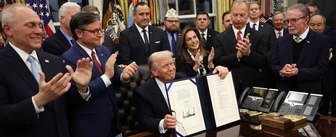Which Americans ought to be honored with a statue or a monument in a public place? The presence, and proposed removal, of statues have occasionally inflamed public debate. The planned removal of a statue of Confederate General Robert E. Lee in Charlottesville, Va., spawned a right-wing protest rally that resulted in the death of counter-protestor Heather Heyer and a life sentence for the driver who killed her.
Lee is a divisive figure today — in addition to leading Confederate forces, he also enslaved people. In the latest Economist/YouGov Poll, as many Americans say there should be statues of him in public places as say there should not be. White Americans narrowly support statues of Lee, by 41% to 33%; Black Americans overwhelmingly oppose them, by 48% to 19%. Southerners also are in favor 43% to 31%, with white Southerners supporting Lee statues by more than two to one, 55% to 23%. Republicans overwhelmingly say there should be statues of Lee in public places, by a four-to-one margin (64% to 16%).
While Lee divides Americans, there are some historical figures on the Economist/YouGov list who do not, including two Black Americans. A recent poll asked respondents whether each of an eclectic group of 16 people should have statues or memorials in public places. Presidents Abraham Lincoln and George Washington are near the top of the list and are seen as appropriate figures for statues in public places by Republicans and Democrats, by white Americans and Black Americans, even though Washington enslaved people. Alongside Washington and Lincoln near the top of the list are civil rights activists Dr. Martin Luther King, Jr., and Rosa Parks, whose actions led to the Supreme Court’s 1956 decision that racial segregation on buses was unconstitutional. Public statues or memorials for King and Parks also are supported by Republicans and Democrats, by white Americans and Black Americans.
Two other women on the Economist/YouGov list — Susan B. Anthony, a major campaigner for women’s suffrage, and former First Lady Eleanor Roosevelt — have support across the board. Women and men believe Anthony should have statues in public places; Democrats and Republicans say the same about Roosevelt.
Beyond that group of six, there are divisions. Just like with Robert E. Lee, statues or memorials for Jefferson Davis, the president of the seceding Confederate States of America during the Civil War, are heavily opposed by Black Americans. In Davis’s case, white Americans are divided on whether there should be statues of him, but Black Americans oppose memorials to him by three to one. More Republicans and white Southerners approve than disapprove. One in five Americans said they didn’t know enough about Davis to evaluate him, more than for anyone else on the list. Davis has a prominent statue in the Statuary Hall of the U.S. Capitol Building, representing Mississippi. Virginia removed Lee’s statue in 2020. Rosa Parks is also in Statuary Hall.
The approval of statues for some of these figures may be just a reaction to not wanting to remove existing tributes. Republican leaders have argued against what they call “cancel culture,” and a March Economist/YouGov Poll found one in four Americans citing cultural issues such as “protection against ‘cancel culture’ ” as more important for Congressional action than policies for other issues such as the economy, jobs, and health care.
While 59% say statues of President Thomas Jefferson are appropriate, that majority masks a racial split. Jefferson’s ownership of slaves is problematic for some. Black Americans divide on whether the writer of the Declaration of Independence should be commemorated, and only a plurality of Democrats support statues for him. New York City officials decided last month to remove a statue of Jefferson from the City Council’s chambers.
Other political individuals get similar mixed or negative responses from some groups. They include Christopher Columbus; Presidents Andrew Jackson and Woodrow Wilson; and Alexander Hamilton. Just over one in 10 don’t know enough about Jackson and Hamiton to evaluate them; 18% don’t know enough about Wilson.
Muhammed Ali, arguably the greatest heavyweight champion of all time, was also a political activist. White Americans and black Americans agree there should be statues of him, though Republicans are more mixed.
The two entertainers on the list, Ella Fitzgerald and Johnny Cash, represent two different genres of music. Cash is better known — and scheduled to have his own statue in Statuary Hall, representing Arkansas. Cash is more popular with men than women. But Fitzgerald gets more support when it comes to being memorialized.
See the toplines and crosstabs from this Economist/YouGov Poll
Methodology: The Economist survey was conducted by YouGov using a nationally representative sample of 1,500 U.S. adult citizens interviewed online between October 30 and November 2, 2021. This sample was weighted according to gender, age, race, and education based on the 2018 American Community Survey, conducted by the U.S. Census Bureau, as well as 2016 and 2020 Presidential votes (or non-votes). Respondents were selected from YouGov’s opt-in panel to be representative of all U.S. citizens. The margin of error is approximately 3% for the overall sample.
Image: Getty








